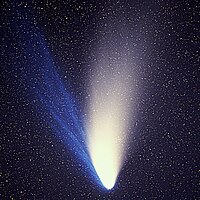Comet Hale–Bopp (formally designatit C/1995 O1) wis aiblins the maist widely observed comet o the 20t century an ane o the brichtest seen for mony decades. It wis visible tae the naked ee for a record 18 months, twice as lang as the previous record haulder, the Great Comet o 1811.
 | |
| Diskivery | |
|---|---|
| Diskivert bi | Alan Hale / Thomas Bopp |
| Diskivery date | Julie 23, 1995 |
| Alternative designations | The Great Comet o 1997, C/1995 O1 |
| Orbital characteristics A | |
| Epoch | 2450460.5 |
| Aphelion | 370.8 AU[1] |
| Perihelion | 0.914 AU[1] |
| Semi-major axis | 186 AU |
| Eccentricity | 0.995086 |
| Orbital period | 2520[2]–2533[1] yr (Barycentric 2391 yr)[3] |
| Inclination | 89.4° |
| Last perihelion | Aprile 1, 1997[1] |
| Next perihelion | ~4385[4] |
Hale–Bopp wis discovered on Julie 23, 1995, at a great distance frae the Sun, raisin expectations that the comet would brichten considerably bi the time it passed close tae Yird. Altho predictin the brichtness o comets wi ony degree o accuracy is very difficult, Hale–Bopp met or exceedit maist predictions when it passed perihelion on Aprile 1, 1997. The comet wis dubbed the Great Comet o 1997.
References
Wikiwand in your browser!
Seamless Wikipedia browsing. On steroids.
Every time you click a link to Wikipedia, Wiktionary or Wikiquote in your browser's search results, it will show the modern Wikiwand interface.
Wikiwand extension is a five stars, simple, with minimum permission required to keep your browsing private, safe and transparent.
